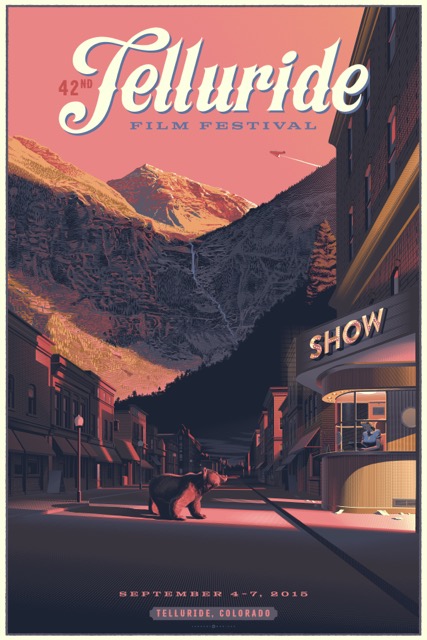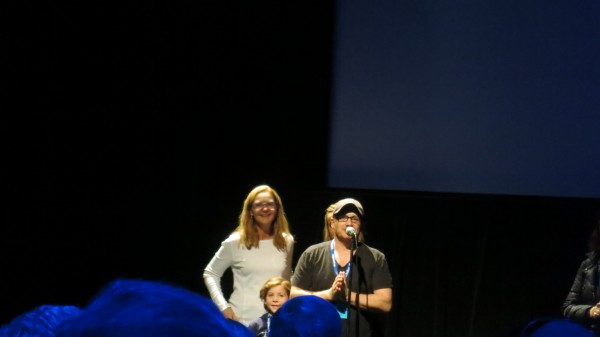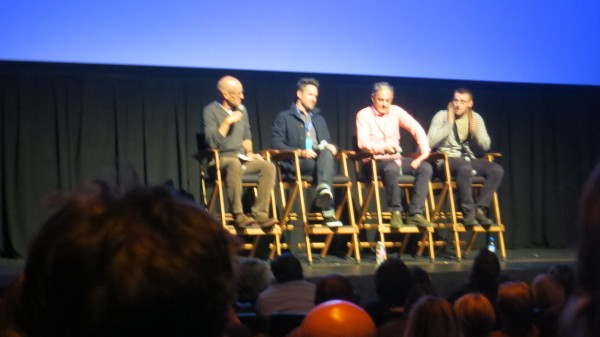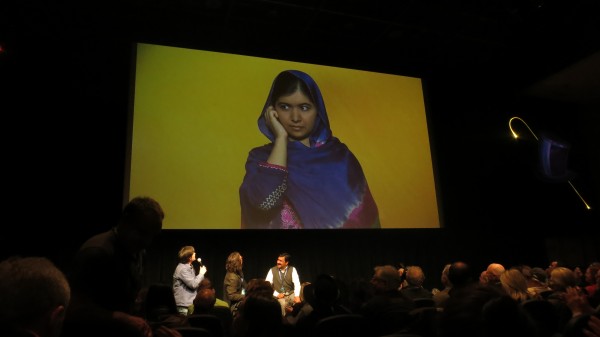
08 Sep Telluride Film Festival #42: Giving Its Strong – Again.
Word on the street: 2015 was one of the best Telluride Film Festivals ever. Its “strong,” (from Festival favorite “Room”), was in evidence right out of the gate, with early screening of films such as “Spotlight” and “He Named Me Malala.” The positive buzz never quit.
Giving Strong: “Room,” “Viva,” “Marguerite”
In director Lenny Abrahamson’s caring, careful adaptation of Emma Donoghue’s taut novel “Room,” a five-year-old boy named Jack (eight-year-old Jacob Trembley, in a preternaturally intelligent performance) follows the voice in his heart and cuts off his long hair, an obvious reference to the biblical hero Samson. He, or his grandmother to be exact, gives the ponytail to his suffering mother or Ma (Brie Larson, in what has to be one of the best – read restrained and believable –performances by an actress this year) because the boy intuitively knows “his strong” will ease her suffering and help her move on.
After all, Jack is not just a little boy. He represents Ma’s inner child and lost youth, stolen by a vicious, if lackluster, predator– which only makes the story creepier.
“The cramped 11-by-11-foot interior of a sealed, sound-proof garden shed isn’t the only thing keeping a boy and his mother prisoner in “Room,” a suspenseful and heartrending drama that finds perhaps the most extreme possible metaphor for how time, regret and the end of childhood can make unknowing captives of us all. It’s a testament to the story’s underlying integrity that, even when deprived of some of the elements that made Emma Donoghue’s 2010 book so gripping, director Lenny Abrahamson’s inevitably telescoped but beautifully handled adaptation retains considerable emotional impact as it morphs from a taut survival thriller into a hauntingly conflicted drama of loss, mourning and gradual reawakening. With enough critical favor (especially for Brie Larson’s superb lead performance), plus a savvy marketing campaign that emphasizes e story’s killer hook, A24 might just have the call-your-mom-sobbing-afterward movie of 2015 on its hands,” wrote Justin Chang in Variety.
Following in the footsteps of Quvenzhané Wallis (Hushpuppy in “Beasts of the Southern Wild,” which won the Oscar for Best Picture in 2013), could Trembley be the youngest boy ever to be nominated in the Best Actor category? He and Larson both deserve a nod.
As told from Jack’s wide-eyed perspective, “Room” is, yes, a jail, but is is also kind of heaven, where Bed and Plant are friends and birthday cake, a miracle.
Abrahamson’s painstakingly constructed film is ultimately a triumphant tale of love over adversity.
Easily one of the best of the Fest, a clear winner of hearts and minds.
For me, the need for Jack’s magical “strong” became a through-line in Telluride this year, where in film after film, characters consistently true to themselves get pushed to the point of breaking, but somehow survive, sometimes even thrive, thanks to some metaphorical ponytail or whatever else might stand in for same and lend strength.
Take Jesus (Hector Medina), the beautifully delicate young gay anti-hero in Paddy Breathnach’s uplifting crowd-pleaser “Viva.”
Jesus ekes out a living as a hairdresser and prostitute (only when absolutely necessary) in contemporary Havana, but fantasizes every minute of every day of becoming a drag queen diva at Mama’s steamy, seamy club, practicing whenever he can, singing and swaying seductively along to old records left to him by his deceased mother. (Luis Alberto Garcia is Mama in a powerful, completely convincing supporting role as a classic stage mom with a heart of gold.)
Then one day, out of the blue, Jesus’s estranged father Angel (Jorge Perugorria in a textured performance as the devil in disguise) returns home to the “most beautiful slum in the world” to wreak havoc on his son’s already bare-bones, hard knocks existence, deepening the boy’s misery.
But only at first.
Macho dad pushes back hard against effeminate son’s hopes and dreams – until the former fighter goes down for the count and needs Jesus’ help to survive.
Yes, “Viva” is sentimental, (but never mawkish). Yes, there is a happy ending, but hey, this is Cuba, where over-the-top is the law of the land.
Three very strong, very physical performances by the leads, particularly Medina, whose gradual reconciliation (with himself and with his dad) and the effective, affecting transformation of Jesus from weak and reactive to a force of nature (on and off Mama’s stage) is a journey everyone easily followed and fully embraced.
‘Viva” came to Telluride without a distributor. Based on the buzz, that should change soon enough – if it hasn’t already.
Best foreign film?
In part, because it has an inherent velocity and is imbued with mystery and magic, music is the beating heart at the center of “Viva” (and Cuba) – and Jesus’s salvation.
Music is also the “food of love.”
At least that is what Marguerite Dumont (the wonderful, winning Catherine Frot, who bears a faint resemblance to Jeanne Moreau in “Jules and Jim”) hopes in French director Xavier Giannoli’s dramedy “Marguerite.”
Marguerite sings, but not for her supper – she is a founding member of the 1 percent club. She sings in hopes of regaining her husband’s love and affection.
She sings loud, way too loud and badly, but from the heart.
Until it breaks.
“Cover your ears and open your hearts: In French director Xavier Giannoli’s pitch-perfect comedy of manners, “Marguerite,” a shameless chanteuse with a surplus of money and a shortage of talent buys her way into the spotlight, exposing the hypocrisy of her unctuous social circle in the process. Inspired by screechy American soprano Florence Foster Jenkins — the selfsame warbler soon to be embodied by Meryl Streep in a forthcoming Stephen Frears biopic — this splendid satire benefits not only from being the first to reach the screen, but also from “The Singer” director Giannoli’s gift for striking just the right tone with such tricky material,” raved Peter Debruge of Variety.
Music may soothe the troubled breast.
Just not this one.
A tragic-comic heroine with a heart of gold and a “sublimely false” voice, who pays her way to the stage with disastrous results. A frustrated (therefore unfaithful) husband (Andre Marcon). Hypocritical friends. A chauffeur/Man Friday named Madelbos, a kind of eminence grise, who documents (in words and tableaux vivant photos) Marguerite’s poignant, downward spiraling story. (It is his images that mark the narrative’s chapter headings. Denis Mpunga is menacing in his right-on-key performance.)
Giannoli, who also collaborated on the script (with Marcia Romano), could have used the set-up to create Gallic farce. Instead he tells a tale of a life lived fully and with passion. He also takes the time to pose a question about the nature of art: Is Marguerite on stage meant to be cinematic equal of Duchamps’ infamous toilet bowl in a museum. Does context make it art? Does intention?
“Marguerite” is satire that walks the thin line between comedy and tragedy. Which, after all, is life.
Telluride audiences laughed and cried – and fell in love.
Another nomination for Best Foreign Film? Actress?
Giving Strong, Hollywood Style: “Carol,” “Suffragette,” “Spotlight,” “Steven Jobs,” “Black Mass,” “45 Years” – and “Taxi”:
Hollywood.
Oops. Did I just say a dirty word?
From the get-go, Telluride Film Festival founders and directors emeriti, Bill and Stella Pence, and now Tom Luddy, also a co-founder, and Julie Huntsinger developed their reputations for integrity by turning their backs on The Industry, Hollywood shorthand for special effects, mind-numbing plots, testosterone-fueled blood-and-gore fests, blockbusters, crowd-pleasing franchises, bad guesses, and good luck. In other words, what we have come to understand is a well-built, well-oiled shock-and-awe machine.
But that does not include films that could become Hollywood blockbusters that feature great writing, bravura acting, and a colorful parade of complicated characters and their struggles with sex, money, social upheaval, and the many and varied treacheries of the human heart.
All of which were prominently featured in Festival films such as “Carol,” “Suffragette,” “Spotlight,” “Steven Jobs,” “Black Mass,” “45 Years.”
All of which have already generated mega Oscar buzz.
During her tribute, asked about her take-away from her latest film “Carol,” Rooney Mara answered “The importance of being true to yourself,” noted above as a recurrent theme in many Festival flicks.
Which therefore feature strong characters.
Many of whom are women.
Mara as Therese, who channels Audrey Hepburn or perhaps Jean Simmons, plays opposite Cate Blanchett, her love interest. Both are luminous in Todd Hayne’s latest bright, bold, beautiful meditation on homosexuality in 1950s America, which was Camelot – unless your sexual orientation was, ahem, aberrant. (His other work on the subject, set at the same time in our history, is the gorgeous “Far From Heaven,” 2002, starring Julianne Moore.).
But “Carol” is really about how vulnerable we all are when we are in love.
For a full review of “Carol,” read Brian Formo’s review in Collider.com here.
Carey Mulligan is in “Suffragette,” director Sarah Gavron’s moving, tense, tight account of the battle to secure voting rights for women in Victorian (rhymes with repressed and male-dominated) London. The movie features a cameo by yet another very strong woman, the incomparable Meryl Streep, who stood in in town for a very pregnant Carey (with husband Marcus Mumford) and was quoted as describing Telluride as “The best festival.”
Mulligan’s Telluride debut was “An Education,” 2009, in which she played a school girl seduced by an older predator, but a willing victim. In “Suffragette,” her character starts out passive, a victim of a dying social order, but emerges radiant and determined, her own person, poor but proud and purposeful.
For a full review of “Suffragette” in The Guardian, a festival sponsor, go here:
Charlotte Rampling stars in Andrew Haigh’s “45 Years,” a powerful drama and North American premiere.
The still-beautiful iconic actress, now 69-years-old, took the Silver Bear for Best Actress at Berlin for her quiet, introspective, ultimately wise and accepting portrayal of a wife in a decent, even good, working marriage thrown off-balance just days before the couple’s 45th wedding anniversary by news from the outside world.
In a career spanning 50 years, Rampling has never won an Oscar…
Kate Winlset stars in “Steven Jobs,” tributee Danny Boyle’s masterful biopic about the man who ultimately turned Apple into a one of the wealthiest companies in the world. Jobs is arguably our Da Vinci, a genius no doubt, but one haunted by Aspergers or something else not good that made it very hard for him to connect with mere morals. Jobs needed “strong” to fix his heart, not his head.
Boyle told a rapt audience at The Palm that his movie is not meant to be “an impersonation, rather it’s a gesture film. It’s about the soul of his mind, all its wonders and horrors.”
Whatever it is or isn’t, Apple co-founder Steve Wozniak (portrayed by a wonderfully beleaguered Seth Rogen and both in town) was reportedly stoked by the film, giving full credit to Boyle and writer Aaron Sorkin for getting it all so right. (Though on the streets, it was whispered they had softened Job’s hard edges. Really? Would not want to have met him in a dark alley. Or in a brightly lit office.)
“The character suffers from reality distortion. He is a monster male made more beautiful by the women in his life,” commented Boyle.
Sorkin should get the Oscar for his writing, 200 pages of his signature super-smart, rapid-fire dialogue laced with insights, insults, and great ideas.
Go ahead, hold a portrait of Jobs side-by-side with that of star Michael Fassbinder: the similarity is striking. Fassbinder, a Telluride regular in films such as “Shame” and “12 Years A Slave,” seemed to have metabolized the visionary – and the man.
“Aaron Sorkin provides the words but Michael Fassbender turns them into music,” raved Kristopher Tapley in Variety.
Fassbinder leaves Telluride a leading contender for Best Actor.
And Winslet?
Let me put it this way. Several people told me told they saw Winslet, blond and beautiful on the stage during Boyle’s tribute, but could not find her on the screen. A bespeckled brunette with short-cropped hair, the actress was, in fact, nearly unrecognizable as Joanna Hoffman, the moon to Job’s sun, vigilantly trying to staunch the heat. A bravura performance as Job’s most trusted and perhaps only friend.
Then there was Brie Larson in the aforementioned, beloved “Room.”
Stars Streep, Mara, Winslet, Rachel McAdams, and Elisabeth Shue were all in town, walking around in jeans and unfussy hair, almost no makeup, admiring the views, loving each other’s company – and the movies.
Just like everyone else, like folks.
Only more so.
Tom McCarthy’s “Spotlight,” on the other hand, is the opposite of a chick flick – or a flick starring chicks – though McAdams does a yeoman job as one of the “boys” in the elite Spotlight group, a kind of hit squad at the Boston Globe, the team which popped the scandal about child abuse in the Catholic Church, not just in Boston, but worldwide.
“Spotlight” features an ensemble cast, including Mark Ruffalo in a totally believable performance. Overall, the cast divides into black hats (priests who abuse kids and the men who covered up) and the white hats (everyone else in Boston, including the valiant reporters). Only Michael Keaton’s character, in real life, Robby Robinson, wore gray. He was the guy who had buried the story 20 years earlier (events took place in 2001), but with a little help from his new editor, a terrific Live Schrieber as Marty Baron, he does the right thing well.
In the slow-grow style of “All the President’s Men,” McCarthy builds the story with increasingly gripping intensity. At the Herzog, you could hear a pin drop. At the end, a collective exhale.
“Same style and verve of All the President’s Men,’ but even more difficult ensemble work,” said celebrated TV exec Dick Ebersol, longtime Telluride local and first-time Film Fest attendee. “And despite the story line, ‘Spotlight’ is not at all preachy. I am a newspaper nut, a Boston Globe fan, so this was the film I wanted most to see. And it was even better than I dreamed it could be.”
A Festival favorite for sure.
Full review by Fred Topol of Crave here.
Reported sightings of Johnny Depp happen every year. And he did not disappoint this year. That is, true to form, he did not check into the New Sheridan Hotel as rumored.
He did not come at all.
Again.
However the elusive actor does show up in “Black Mass,” but in disguise – teeth, eyes, hair – as super creep James “Whitey” Bulger in Scott Cooper’s “Black Mass.” A variation on the theme of Voldemort.
No really.
Death follows in his wake.
“My film does not romanticize criminals,” said Cooper in his Q & A.“It is not about criminals who happen to be human, but humans who happen to be criminals.”
As misguided FBI agent John Connolly, Joel Edgerton, who was in town, is terrific too.
There were no lemons in the strong cast.
Cooper cast well and then gave his actors lots of rope.
(Under the circumstances, maybe not the best metaphor.)
“Black Mass” is scheduled to open September 18. Reviews are everywhere, almost all praising Depp’s transformation.
Jafar Pahani’s “Taxi” won the top prize at Berlin.
Pahani is a now-famous Iranian director, jailed by his government for poking a thumb in its eye, but serving a reduced sentence of a mere 20 years of house arrest because, well, now he is now a Big Fish in a film pool.
Pahani’s personal story is just as absurd as his latest film, which is Marx Brothers funny. In it, he stars as taxi driver who ferries a series of characters – and we mean that in the literal sense of the word – around Tehran, to make a film using a dashboard camera that is, natch, politically charged.
Taxi is actually an anti-Hollywood movie: low budget, no actors, no frills.
A few spills.
Including a fish bowl.
Giving Strong: Docs “Time to Choose” and “Malala”:
On hand to introduce Charlie Ferguson’s “Time to Choose,” iconic documentary filmmaker and member Film Fest’s board of governors, Ken Burns, summed up the difference between documentaries and features this way:
“Both genres share the notion of telling a story well. We documentarians, however, can’t make stuff up. We provide a home for not making things up. And Charlie Ferguson does that with the forensic intensity of a pathologist dissecting our world.”
Ferguson did that in “No End in Sight,” about the Bush administration’s war in Iraq.
He worked that voodoo in “Inside Job,” about the financial meltdown of 2008.
But in “Time to Choose,” Ferguson, known for his biting wit peppered with cynicism, explores the subject of climate change with an urgency that sets your teeth on edge.
The real value of the meticulously researched film is that fact that solutions, yes, actual, doable solutions are imbedded in many of its beautifully shot frames, all of which are increasingly viable.
“I found myself trying to make a spiritual film about finding balance with the planet. Only a small number of people are in the way,” he said.
And it may be an inconvenient truth, but we all know it is “Time to Choose.”
High on the list of films featuring characters who follow their bliss towards happy endings and/or the greater good is the documentary that actually opened the weekend with a bang (no bad pun intended) before a packed house at the Chuck Jones.
“He Named Me Malala” is Davis Guggenheim’s 87-minute, moving (as in hardly a dry eye in the house) tribute to 18 (just)-year-old Nobel Peace Prize laureate Malala Yousafzai, the very courageous Pakistani teen from the once picturesque Swat Valley, who stood up to the Taliban in support of education, for girls especially, and got shot in the head (in 2012) for her very vocal, very passionate stance.
And lived.
Unlike her namesake, a legendary Afghani heroine who, in the late-1800s, rallied Pashtun fighters against British invaders and was killed in battle, a story depicted in one of many beautifully animated sequences in the doc.
It was a shot heard ’round the world.
For those of us who squirrel away in our individual small ways, it is awe-inspiring realize that one person, even a very young person, can be an irresistible, irrepressible force for change. Spurred to action and guided by her educator/activist father, Ziauddin, Malala is a guide for all that is good and possible in the world.
Burns described the father-daughter team as “one soul in two different bodies.”
While his filmmaking is slickly elegant, Guggenheim still does a good job of peeling away some of Malala’s (well-covered) layers to reveal a girl like other girls, complete with a teenage crush on the likes of Brad Pitt.
And yes, Guggenheim is a puppeteer who tugs hard on our heart strings, but no one in the audience seemed to care. After all, this is a girl, who, in her Skype interview, answered Burns’ daughter Olivia’s question about her assailants by saying: “We should have forgiveness for others, I have forgiven them.”
When the picture on the world screen is as dark as pitch – terrorism, genocide, regional upheaval, political debauchery, dizzying financial swings – hope is center stage in this beautifully drawn, character-driven documentary.
Malala clearly has her own strong.
FOMO at Film Fest:
Fear Of Missing Out.
Let’s just cut to the chase.
You did.
However many lines you stood in.
However seats you warmed.
We missed a number that got big buzz, among them, “Son of Saul,” ‘Ixcanul,” “Rams,” Netflix’s “Beasts of No Nation,” and “Taj Mahal.”
Here’s a quickie from my friend and film buff Nancy B. Frank about the latter:
“The French writer-director Nicolas Saada spoke before his film, ‘Taj Mahal.’ He said his is a true story that had been told to him by a young woman, age 18, who had been trapped in her hotel room alone during the terrorist attack on the Taj Mahal Hotel in Mumbai in 2008. Saada stated that he wanted to tell that story without exploitation. What struck me was that, in an American director’s hands, the movie could have become literal in its use of violent sensationalism. Instead, it realistically portrayed what has become a part of our present culture – how terrorism is affecting our world in random, but in a very personal and intimate way. ‘Taj Mahal’ was perfectly paced. The tone of suspense had me on the edge of my seat.”
Ok, so now No ‘mo FOMO.
Check out the After the Festival Film Festival.






Sorry, the comment form is closed at this time.